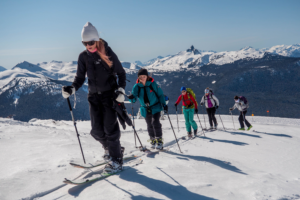Tag Archive for: whistler
Being adventure smart in the springtime backcountry
The recent sunny weather has been gorgeous for heading into the backcountry on skis, a snowboard or sled for springtime lines, outstanding views, and end-of-day hangouts catching the final rays with your friends. But, as we all know, the backcountry needs to be treated with respect. We caught up with Joelle Tiessen, Marketing Director of Mountain Skills Academy & Adventures (MSAA), for guidance on how to safely make the most of springtime in the backcountry.

Dress in layers:it get warm hiking in the Spring. Photo credit: MSAA
What steps do you recommend beginners take before heading into the backcountry to ski, snowboard or sled?
Tiessen: Before anyone heads into the backcountry, the first step is always to take a Level 1 Avalanche Skills Training (AST 1) course. This course makes you aware of the dangers of travelling in uncontrolled terrain and beyond the ski patrol resort boundaries. [In resorts patrollers manage the terrain and are also available for rescue. “Uncontrolled terrain” isn’t managed to reduce the risk of avalanche or other hazards such as crevasses, and rescue may not be possible—Editor.] If you are planning to go into the backcountry you want to always carry a transceiver, probe and shovel. The AST 1 course teaches you how to use these tools in an avalanche rescue situation and how to stay out of avalanche trouble spots so hopefully you never need to use those skills.

Learn about safety in the backcountry on an introductory Level 1 Avalanche Skills Training course. Photo credit: MSAA
What would you recommend somebody brings in their bag on a backcountry trip? AdventureSmart recommends these 10 items (a flashlight, fire-making kit, signaling device, extra food and water, extra clothing, navigation/communication aids, first aid kid, emergency shelter, pocket knife and sun protection), but do you have any further tips?
Tiessen: One item that we would add to this list is a repair kit for your gear. You don’t want to have a binding or pole or other key item break while you are way out in the backcountry. If something does break, having spare parts, duct tape, ski straps and a multi-tool can come in very handy and make the difference between getting back before dark or spending a long night out.

Duct Tape can get you out of a sticky situation.
Is avalanche.ca the best website to check on conditions? Or do you know of other resources?
Tiessen: For the Sea to Sky area, avalanche.ca is the best resource for avalanche conditions. It’s also good to get in habit of browsing a Facebook group like South Coast Touring to read about individual experiences in specific locations. Another source for a little geeking out is the Wayne Flann Avalanche Blog. There are many more, but find your favourites and keep current on local conditions throughout the season.
The backcountry is a pretty intimidating place, do you recommend any ways for newer adventurers to get ongoing guidance and mentorship?
Tiessen: There are several local groups who meet up casually (like South Coast Touring on Facebook) and welcome new tourers (who have taken AST1), there are also mentor groups like Mountain Mentors for women. Hiring a local ski guide for a day is a great way to get into new terrain and learn tips to make your touring experiences better and safer. Many local shops also offer clinics for free or a minimal fee on certain dates throughout the season. And if you like to geek out a little, our local bookstore [Armchair Books. You can also try Whistler Public Library.] has titles on avalanche topics and there is also YouTube for mini instructional videos to keep your skills fresh. If you are very new and not sure you’re ready to commit to all the gear and training, just take an Intro to Backcountry guided tour where you can get a taste and see if touring is for you.

What should experienced backcountry adventurers do to keep their skills fresh? I’ve heard it’s important to take an annual avalanche safety refresher course.
Tiessen: It is good to practice your avalanche training skills regularly, especially at the beginning of each season. You can do this with your touring friends or take a one-day refresher course with a professional guide to continue learning. There are also options to build more advanced rescue skills by taking a Companion Rescue Skills clinic or going even farther and taking the Level 2 Avalanche Skills Training course. There is a snow field up on Blackcomb Mountain near the Rendezvous where patrollers bury transceivers to practice searching, and members of the public are welcome to practice there as well.
If someone is vacationing in Whistler, is there a way for them to safely experience this area’s backcountry without owning all the equipment?
Tiessen: The best and safest way for visitors to get into the backcountry is to go with a local guide who can show them around terrain appropriate to their skill level. There are a couple of local businesses that specialize in renting all the touring gear you need from skis, skins, splitboards, transceivers, probes and shovels and even avalanche airbags. MSAA’s tours do not include rental gear but we partner up with Escape Route Alpine Demo Centre and they offer our guests a 20 per cent discount on most rental gear. [Excess Backcountry is another option—Editor.]
Read more about being adventure smart in the backcountry here and Mountain Skills Academy & Adventures. For more adventures, join us at GO Fest from May 17 to 20.
The Art of the Après
There are about a thousand reasons to come to Whistler but only one reason to stay once the lifts close: après ski.
Unofficially starting at 3:30 p.m. but officially starting whenever your legs turn to rubber, your hands are so cold you can’t hold onto your poles or crank your bindings, or your stomach is growling so loud that the person next to you on the lift wonders if you’ve got an angry cat stowed in your jacket, après ski (known more commonly to the cool kids as just “après”) is the backbone of mountain culture. It is the essence of every ski town, the raison d’être for not crawling into your bed, hot tub, or couch at 3:50 p.m. with quivering legs because you shredded Peak to Creek one last time (and death before download), and ignoring the world.
Après is where the world comes to you – or rather, the world is around you and you get to choose how you want to see it.
Whistler is no exception to the grand scale of the après life, offering a veritable Choose Your Own Adventure of options, from rowdy boot-stomping, beer-sloshing bar-top dancing venues to wide-open patios that give you unparalleled views of mountains and the hundreds of people walking by, to darker quiet places by firesides that allow you to refuel and gather your zen for your next day of epic pow.
But before you drag your weary body into the first place who’ll seat you and your dozen friends and gnosh on the first item on the menu, there’s a few things you should know.
1.We likes our poutine. And beer. We’ve got many varieties of both.
2. Nachos here are like cowboys: they’re bigger, badder, and more legendary than the ones next door. Everyone will judge you if you don’t share your order. Or your beer.
Nachos anyone? #apres #whistlerblackcomb #nachos
A post shared by Peter Corbett (@pete_corbett1983) on
3. Butt rub mayo. Get some and order extra. Trust us.
Feed your cravings! Burgers + Butt Rub | #SkiEatDrink #Lunch #Creekside #AprerSki
A post shared by Dustys Bar & BBQ (@dustyswhistler) on
4. We love our local bands and musicians. Like, really love them.
5. This is the only time you get to dance in ski or snowboard boots. Bonus marks if you can clamber onto a bar top with either still done up.
A post shared by Tourism Whistler (@gowhistler) on
6. If you leave Whistler without doing a shot ski, you’ll regret it for the rest of your life. Bragging rights if you get it with a fireball.
7. Patio, people, patio. That’s the best place to soak up the sun, gawk at everyone else walking by, pick tomorrow’s lines, and keep an eye on your gear.
Nothing is better than Apres ski. #longhornsaloon
A post shared by mfisher2010 (@mfisher2010) on
8. You can order a peppermint patty once. After that, you will be judged.
9. Don’t forget to tip. We all have to pay rent.
10. Après doesn’t end when the mountains close. You can après after that epic spring hike, that blistering summer bike ride, or that grueling fall run. Whistler is open year round, and so are your choices for après.
A post shared by Dustys Bar & BBQ (@dustyswhistler) on
Cover photo: Mike Crane
The Wonder of Whistler’s Night Skies
The Wonder of Whistler’s Night Skies: What you need to know to capture them for yourself
Whistler’s known for its incredible views, bolstered by bluebird days and stunning peaks. But once the sun goes down there’s nothing like the quiet of a myriad of twinkling stars peeking through treetops or the shimmering beauty of the Aurora Borealis as it dances in the sky. Throw in a backdrop like the Black Tusk, a glacier, or an ancient Douglas Fir and you may never want to see daylight again.
Before you strap on a pack and head out for the night with your camera, here’s what you need to know:
- Check the weather and moon phases. The last thing you want is to be on top of a mountain in a lightning storm or taking pictures of the Milky Way during a full moon. You’ll want a clear sky with no cloud cover if you’re taking pictures of the stars.
- Dress for the cold. It gets cold, very cold in the alpine. Bring warm gloves, a headlamp, and a toque plus an extra layer. A warm thermos of tea or hot chocolate will keep your insides warm while you sit and wait for the ideal picture.
- Bring food. You’ll probably be hiking or bushwacking to get that perfect shot. All that work will build up an appetite, especially since you’ll be carrying all that gear.
- Speaking of gear, make sure you have it all. You’ll want a tripod to get that crisp image since there is less light and your hands won’t stay still enough for your slow shutter speeds. Bring all your lenses, many empty memory cards, and a shutter release cable so you aren’t touching the camera and making it jiggle.
- Scout your area during the day. This is a great time saver since you can look for ways around objects like trees, houses, mountains, boulders or chairlifts – or the best angle to include them.
- Download a star app. This will help you know which stars or planets you’re looking at, and help you find the ones you want.
- Don’t forget to tell others where you’re going. Even if you’re walking up the hill at the back of your house, let someone know where you are and when you’ll return. The smallest rock or root can be invisible at night and leave you susceptible to tripping – especially if you’re looking up. Plus it’s easy to get lost in the dark. See tip #5 to avoid this.
- Memorize where infinity is on each of your lenses. Focusing is one of the greatest frustrations in night photography. While each lens has an infinity mark, it may not be accurate. Take the time to memorize where it is on each of your lenses and you’ll be significantly less frustrated in the dark when it’s cold out.
- Be prepared to wait. Night photography is all about slow shutter speeds and long exposures. Don’t expect to snap a shot in five minutes. Commit to the night and you’ll be rewarded with the vibrant, dramatic shot that your imagination envisioned.
Cover image: Mike Crane
Respecting Whistler’s Great Outdoors and #GOGreen
Earn your time outside by interacting with planet Earth more mindfully in your daily life. Learn how from Whistler’s environmental experts at the GO Green @ GO Fest Environmental Expo on Saturday, May 21st from Noon-5:00 p.m. in Whistler’s Town Plaza. In the meantime, here are some wise ways to adventure in and interact with our planet:
Be Bear Smart –To avoid a dangerous encounter with black bears and grizzlies always remember to carry bear spray, makes lots of noise, travel together, avoid animal carcasses, keep your distance, never feed a bear (even if unintentionally) and pack in what you pack out. To learn about our furry friends, visit the Coast to Cascades Grizzly Bear Initiative or the RMOW Bear Smart Program at the GO Fest Environmental Expo.
Love This Place, Reduce Your Waste – Recyclables and organics are valuable resources that don’t belong trapped in our landfills. Improve your recycling knowledge at the GO Fest Environmental Expo with the AWARE Zero Waste Station, BC Recycles and ElectroRecycle. Be remembered by the memories you leave behind, not the trash!
Plant Wisely – Green your knowledge as you green your thumb by educating yourself on native, drought resistant species, and the invasive plants to avoid. Invasive species threaten our environment, economy and health. Learn how to identify and control invasive species with the Sea to Sky Invasive Species Council at the GO Fest Environmental Expo.
Adopt a Plant Based Diet – While it’s hard for many to swallow, the simple truth is reducing meat consumption is one of the most impactful environmentally conscious acts an individual can take. Learn more about stats and facts with Earthsave Whistler at the GO Fest Environmental Expo. Don’t feel like jumping into the deep end of the veganism pool? Dip your toe in instead by signing up for Meatless Mondays and see what it’s all about.
To find out more about the bountiful work Whistler is doing for the health of our planet talk to the RMOW Environmental Technician or Whistler’s environmental charity since 1989, AWARE. Get outside and play, a little more mindfully today. #GOGreen
GO Fest Keeps Long Weekend #FOMO At Bay
While many Canadians celebrate the May Long weekend by opening the cabin, barbequing or heading into the wilderness to camp, in Whistler, GO Fest, Whistler’s Great Outdoors Festival, kicks off the summer season with events and activities offering the best that winter and summer have to offer, all in one weekend.
GO Fest boasts a line-up of events and activities designed to let you get out and play on a whim with no need for weeks or months of training and preparation, or even gear, for that matter!
Solo players or friends, who thrive on spontaneity, will find their paths for adventure at GO Fest’s Base Camp in Mountain Square. Base Camp will house activities information for all of the festival events and activities, as well as the Tiger Ping Pong Tournament where anyone can pick up a paddle and join in the game. Fly fishing clinics, including one just for women, a King of the Beach format beach volleyball tournament at Rainbow Park, yoga, the Whistler Film Festival Adventure Film Series, sailing, golfing, a digital photography clinic and art experiences are some of the many events and activities available in Whistler on May Long weekend.
At 7:30 p.m. each day on the Main Stage in Village Square, free concerts by Dan Mangan (May 20), Alex Cuba (May 21) and The Matinee (May 22) will provide the soundtrack to a memorable May Long Weekend.
Play and stay in Whistler during GO Fest, Whistler’s Great Outdoors Festival. Book by June 30 and save up to 40 per cent by staying longer through Whistler.com www.whistler.com/events/gofest/.



